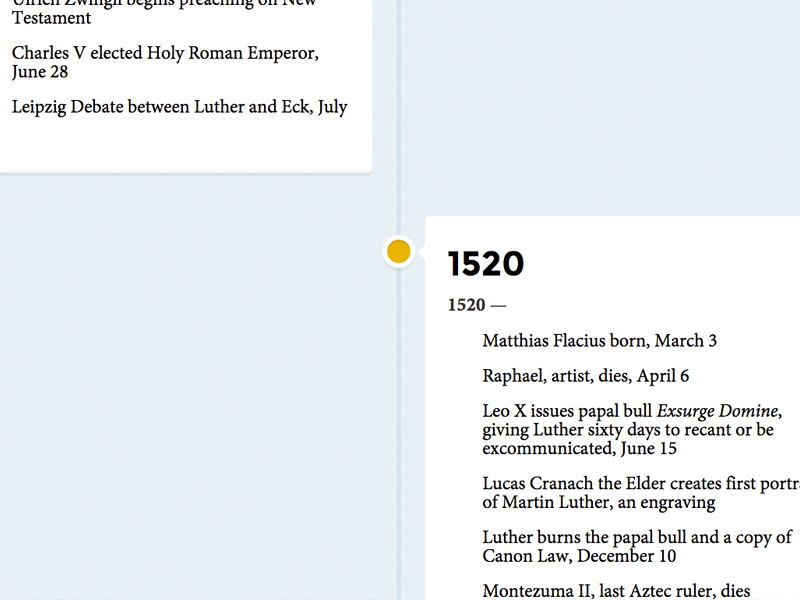Stroll through Luther’s time and learn about the main events that started the Reformation. Discover a rich timeline of people, places, and events!


Stroll through Luther’s time and learn about the main events that started the Reformation. Discover a rich timeline of people, places, and events!
by Rev. Dr. Mark Birkholz What was the Reformation about? Indulgences? Purgatory? The authority of the pope? Education? Luther? Here (as in Sunday School) the answer is simple: Jesus. The Reformation was all about Jesus. Specifically, the Reformation was about Jesus Christ’s death on the cross as our only source of forgiveness, life, and salvation…. Read More >
by Rev. Christopher Maronde As the sixteenth century dawned, there were essentially three answers given to the question: who rules the Church? The first answer given was the most obvious to those who have even a passing acquaintance with the history of the Reformation: the pope. Martin Luther was baptized and ordained into a Church where the… Read More >
by Rev. Aaron Moldenhauer Near the beginning of The Proper Distinction between Law and Gospel, C. F. W. Walther compiles a list of differences between law and gospel. One point of difference is that the law’s promises are conditional, while the promises of the gospel are unconditional.[1] How tempting and easy it is to confuse… Read More >
by Mr. Jonathan A. Swett In 1523 Martin Luther wrote his first hymn for congregational use, “Dear Christians, One and All, Rejoice” (LSB 556). It appears as the first hymn in the first published collection of Lutheran hymns, Etlich Cristlich lider of 1523/24—known as the “Achtliederbuch” because it contained eight hymns—four of which were written… Read More >
by Rev. Michael Schuermann One of the chief concerns of the Lutheran Reformers was to protect the conscience of each believer from being harmed by the burdens of works-righteousness or other sorts of legalism. They recognized that because of sin, man’s burdened conscience was driving him to seek relief in some way. God provided true… Read More >
by Dcs. Carolyn S. Brinkley The Praying Hands is a unique icon in Western art that has transcended the sacred and entered the world of pop culture. It is seen on almost every kind of object imaginable: tattoos, necklaces, bumper stickers, clip art, plaques, charm bracelets, tee-shirts, bookends, street art, afghans, cremation urns, soap, and… Read More >
by Dr. Jack Kilcrease Although in modern parlance, the term “martyr” has come to mean a person who suffers and dies for a cause, the original meaning of the Greek word is merely “a witness.” Throughout the early Church one of the main ways that people testified to their faith was through suffering and death… Read More >
by Rev. Dr. Mark Birkholz The Reformation was not just a movement among the cultural and religious elite. Ordinary people of Germany and beyond were captivated by the gospel, newly presented to them by Luther and the Reformers. The laity were engaged by the gospel in many different ways, through newly composed German hymns, the… Read More >
by Rev. A. Brian Flamme Luther writes in the Large Catechism, “Places, times, persons, and the entire outward order of worship have therefore been instituted and appointed in order that God’s Word may exert its power publicly.”[i] A modern reader who insists that he’s “spiritual but not religious” might be surprised that Luther would recommend… Read More >